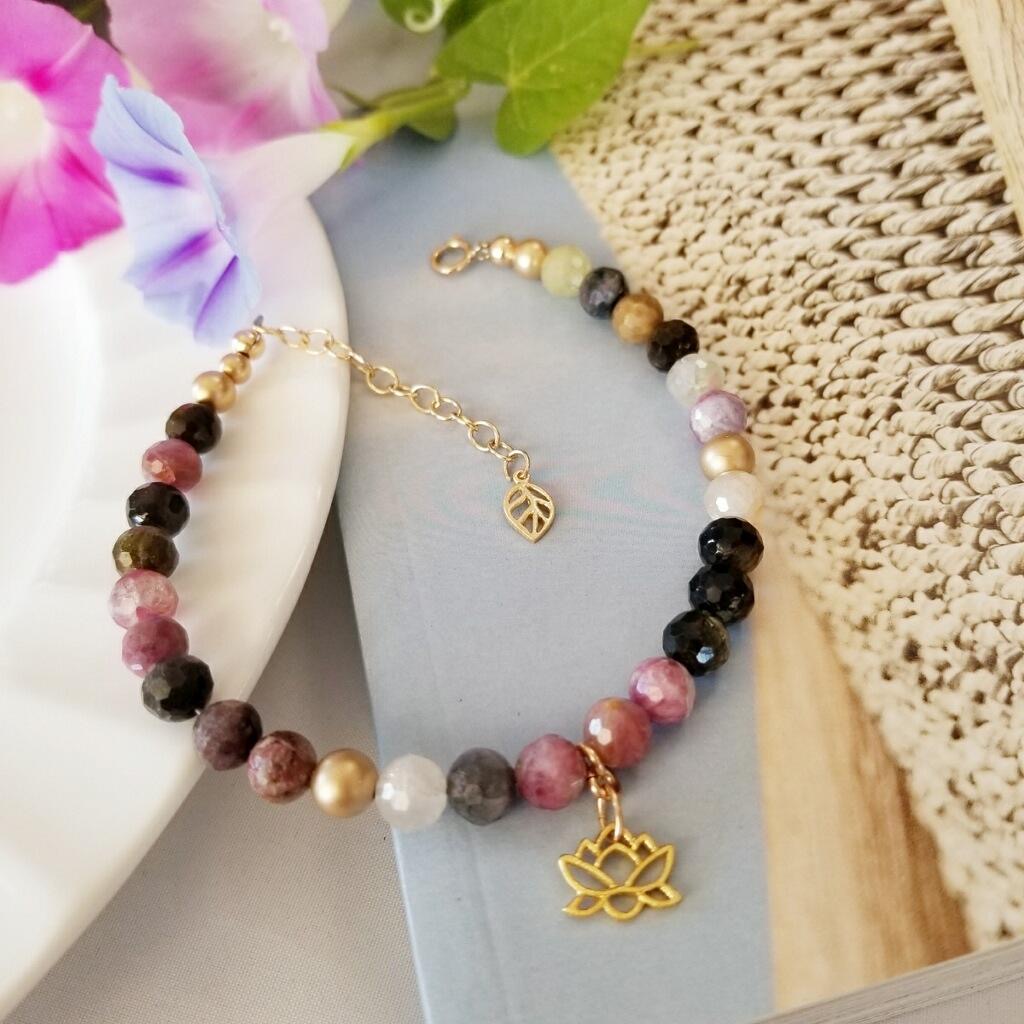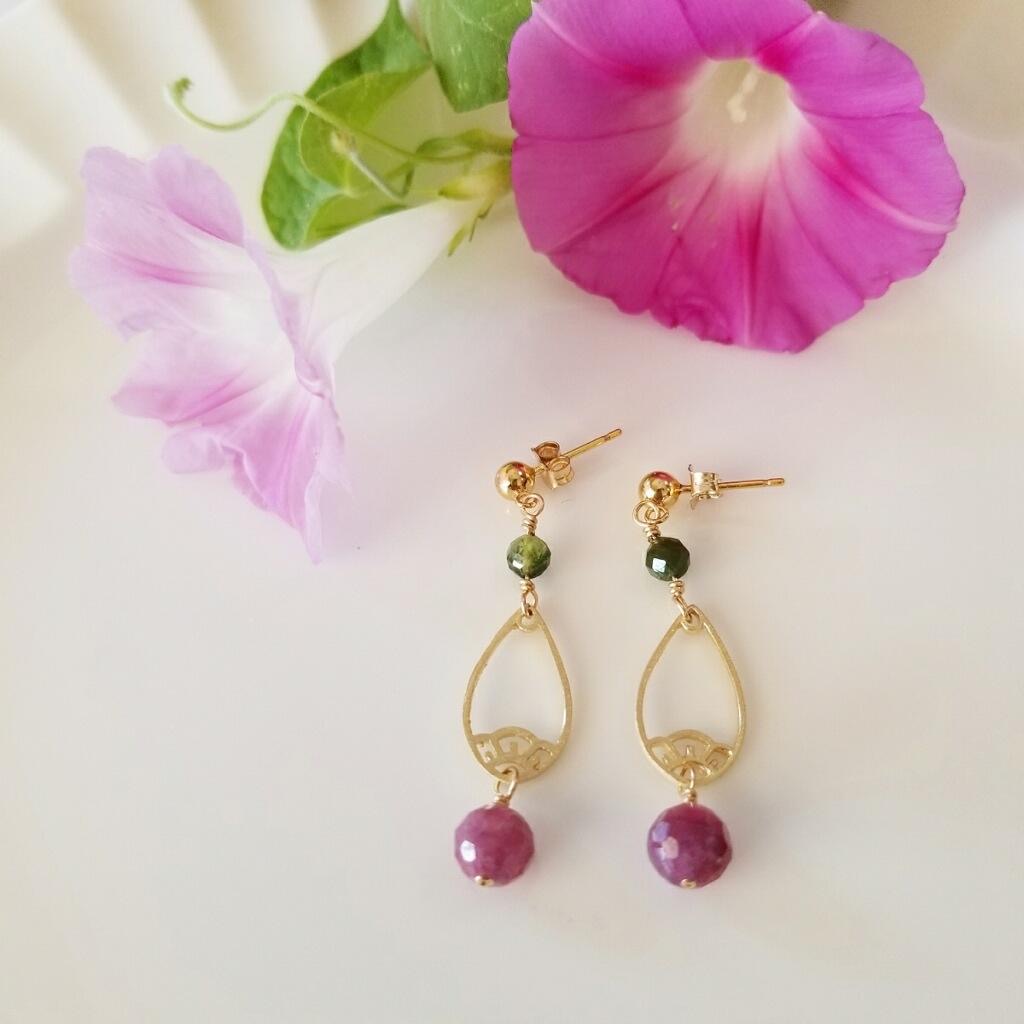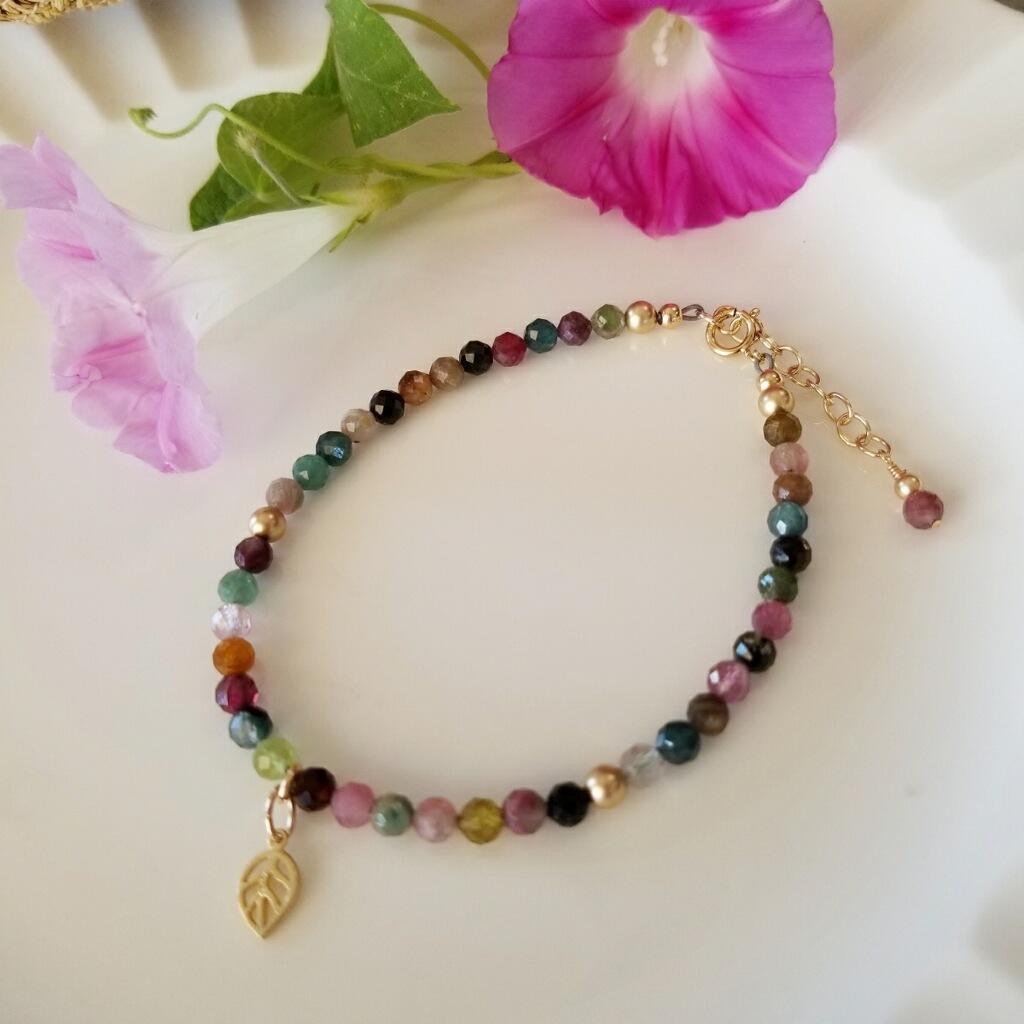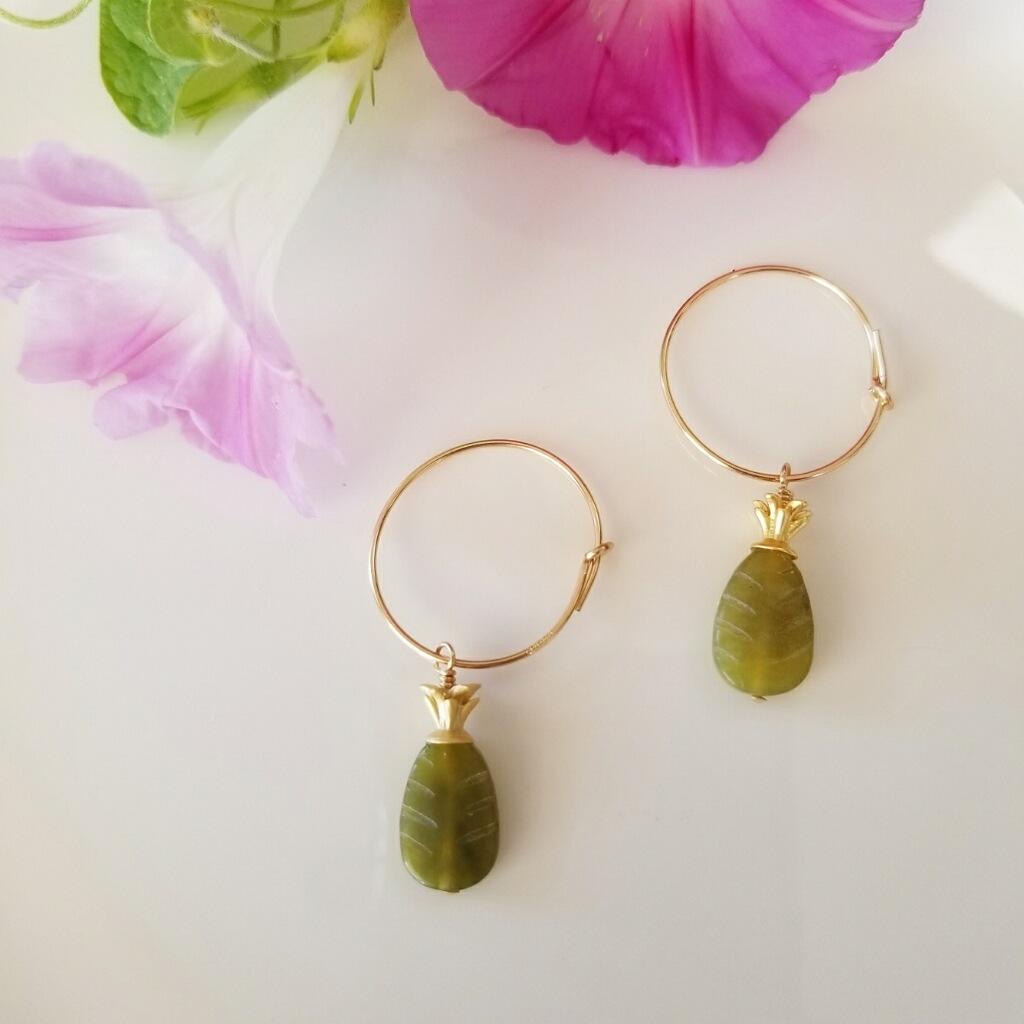Rainforest, Ruby & Rainbow Knotted Tourmaline Necklace
Rainforest, Ruby & Rainbow Knotted Tourmaline Necklace
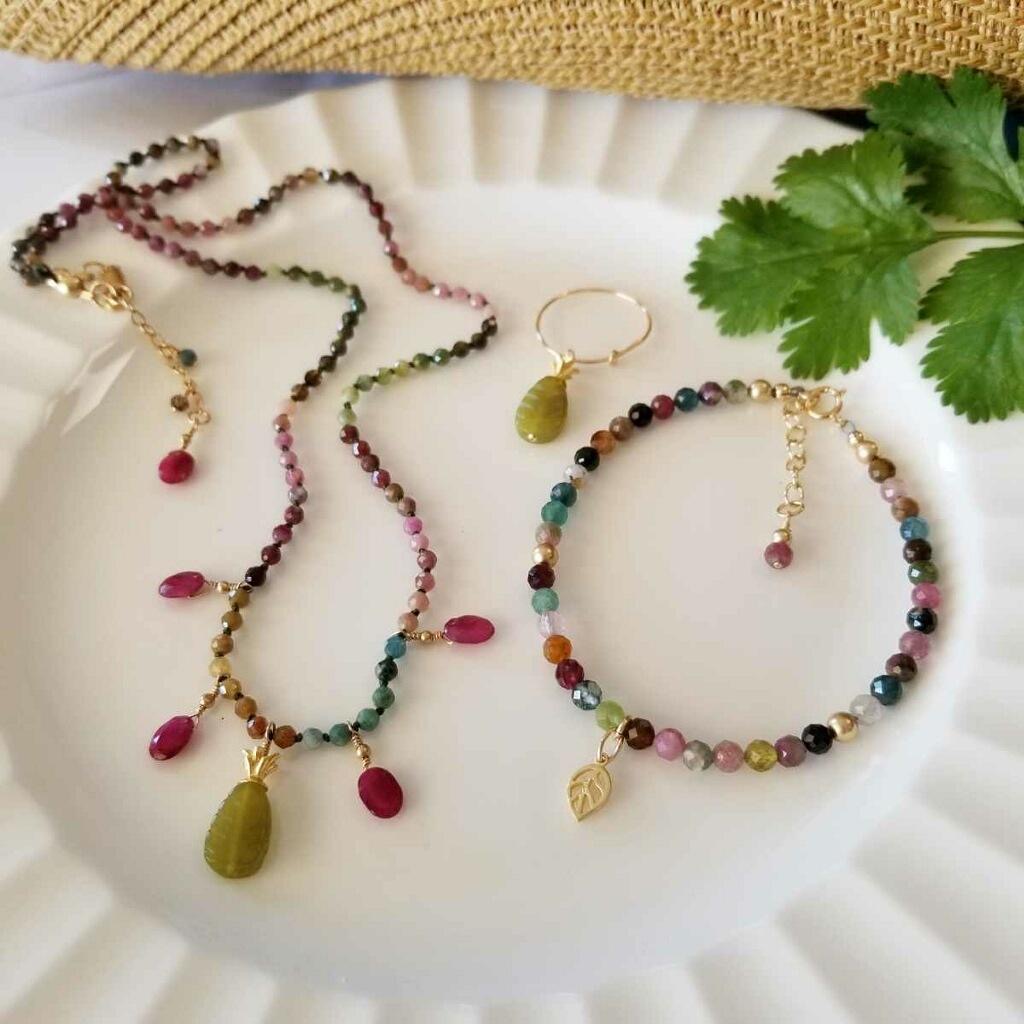
Materials Needed:
- 3mm Faceted Round Multi Color Tourmaline (120)
- 5x7mm Top Drilled Faceted Ruby (can be found at our retail locations, drops or briolettes can work too) (5)
- Amoracast – Pineapple Crown Cap – Vermeille (1)
- Olive Jade - Leaf (1)
- Griffin Silk #3 Olive Green (1)
- Clamshells 14k Gold Filled (2)
- Lobster Claw Clasp 14k Gold Fill (1)
- Chain 14k Gold Filled (large enough links to fasten into, used for extension chain 1 1/2” Used
- 4mm Round 19g 14k Gold Fill Open Jump Rings (2)
- 5mm Round 19g 14k Gold Fill Closed Jump Rings (2)
- 2mm Sandblast Beads, 14k Gold Filled (1)
- 2” 26g 14k Gold Filled Headpins (8)
Finished Length 16 – 17 1/2”
Tools Required
Instructions on Construction:
I am not usually a big fan of ironing my Griffin silk but find that when using the lower #’s (thinner cords) & smaller beads this helps a lot, as it removes the kinks that are caused by packaging. With heavier beads this isn’t usually a problem because the weight will pull the kinks out. You can also pre-stretch your cord which should help keeping knots where you want them to be!
1. The first thing you will do is to tie an overhand knot at the end of your silk cord (the opposite end to where the needle attaches) leaving a small tail (sometimes I do a 2nd knot) and then take a size 11 seed bead & thread on so that it sits next the knot. At this stage you are ready to thread your needle & cord through the hole in the clamshell where your knotting will start.
*The reason I add a small seed bead on the inside of my clamshell is because it adds an extra layer of security against my knot pulling through the hole in the clamshell. This is especially important when using the smaller gauge knotting cords).
2. ** Also note that some clamshells hinge at the back & some on the side, plus some have holes so that you can use jump rings with & others (like the ones used here) have a small arm that you bend to form the link that attaches to clasp. Phew, information overload!
3. The cord should now be exiting your clamshell at the appropriate place. Tie your first knot so that it sits tight against the opening of clamshell. Use you preferred way of knotting, tweezers, awl or fingers… just make sure that your knots are in the correct place before tightening fully…. It is a bear to try to undo knots!
4. Before you start threading your beads you will need to make your wire wrapped dangles. You will use five top drilled rubies (4 for the necklace & 1 for extension chain). You will be using the 26g headpins for these wire wraps. Cut the end cap off the headpin, make your tent wrap through the top drill on the ruby, using the needle nose pliers & round nose pliers. Add one 2mm sandblast gold bead, then make wire wrap to complete dangle, this loop should be small (but large enough to thread comfortably onto knotting cord).
5. To make pineapple dangle: Use the 26g headpin & thread on the olive jade leaf with the fat side at the bottom, add the pineapple crown top & make your wire wrap with loop (same size as the loop on ruby dangle). It is a little challenging to wrap on the inside of the pineapple crown… but take it slowly & you will get there.
*I found the pineapple top did move a little even when I wrapped as close as I could, so I used a small dab of glue & let this set up… it worked great.
6. Now you are ready to string your beads & the griffin silk has a built-in needle that helps a lot. I try to thread the beads straight from the strand they come on, directly onto my griffin silk.
*You may find this easier if you trim the needle a little, not so bendy that way!
7. The pattern for this necklace is as follows: 53 x 3mm tourmaline, 1 x ruby dangle, 4 x tourmaline, 1 x ruby dangle, 3 x tourmaline, 1 x pineapple dangle (mid-point), 3 x tourmaline, 1 x ruby dangle, 4 x tourmaline, 1 x ruby dangle, 53 x tourmaline.
8. Let the knotting begin! In this piece I knotted between every bead, making sure that the knots were nice and tight against the previous bead.
9. Once you reach the end, do a final knot, then enter into the second clamshell so that you are in the position with cord coming through from outside into the interior of the shell (the opposite of how you started your piece). You will now add a size 11 seed bead & tie one or two knots to tightly secure the seed bead.
10. At this stage I trim or use my Thread Zap to get rid of excess cord…make sure your knots are secure before trimming! I use a little glue to secure the bead/knot to the inside of clam shell…. You do not want excess cord to show when clamshell is closed. Repeat this process with both clamshells.
11. If you are using the type of clamshell with 2 rings you may now gently close your clamshell with your needle nose pliers & you can use jump rings to attach lobster claw clasp to clamshell on one end & extension chain on the other end. Open your jump rings with flat nose plier & needle nose plier (one on either side of the break point) open to the side & only as much as needed to thread on clasp or chain, then close so that pieces line up nicely.
12. If you are using the other type of clamshell you will need to take your round nose pliers and manipulate the arm so that it will be enclosed when the clamshell is closed. This often acts in place of a jump ring so don’t forget to thread on lobster claw clasp/chain, before gently closing your clamshell (with needle nose pliers) if not using jump rings.
*** In this design the clamshell arm closes into a 5mm closed jump ring on either end & then uses the open jump ring that comes with lobster claw clasp & a 4mm 19g open jump ring to attach to the extension chain on the other end.
13. The chain is completed with the addition of the fifth ruby dangle that is attached with a 4mm 19g open jump ring (your other option is to attach this dangle directly to the chain before completing your wraps). You can also add optional tourmaline dangles to this extension if you choose to.
14. Try on your new necklace & admire your handiwork!
15. Enjoy!
Jewelry Designed by Steph Stirniman
Check out how to make the rest of our Rainforest and Rainbow Collection
Recent Posts
-
Christmas Bow Garland - Mini Tutorial
Christmas Bow Garland - Mini TutorialCreate your own holiday decor with a Christmas-colored bow garl …14th Nov 2024 -
Charm Necklace Tutorial
Charm Necklace TutorialEmbrace individuality with our Personalized Charm Necklace tutorial, a perfec …6th Nov 2024 -
Double Loop Peyote Earrings
Double Loop Peyote EarringsLearn all about creating a seed bead circle using the peyote stitch techn …21st Oct 2024


